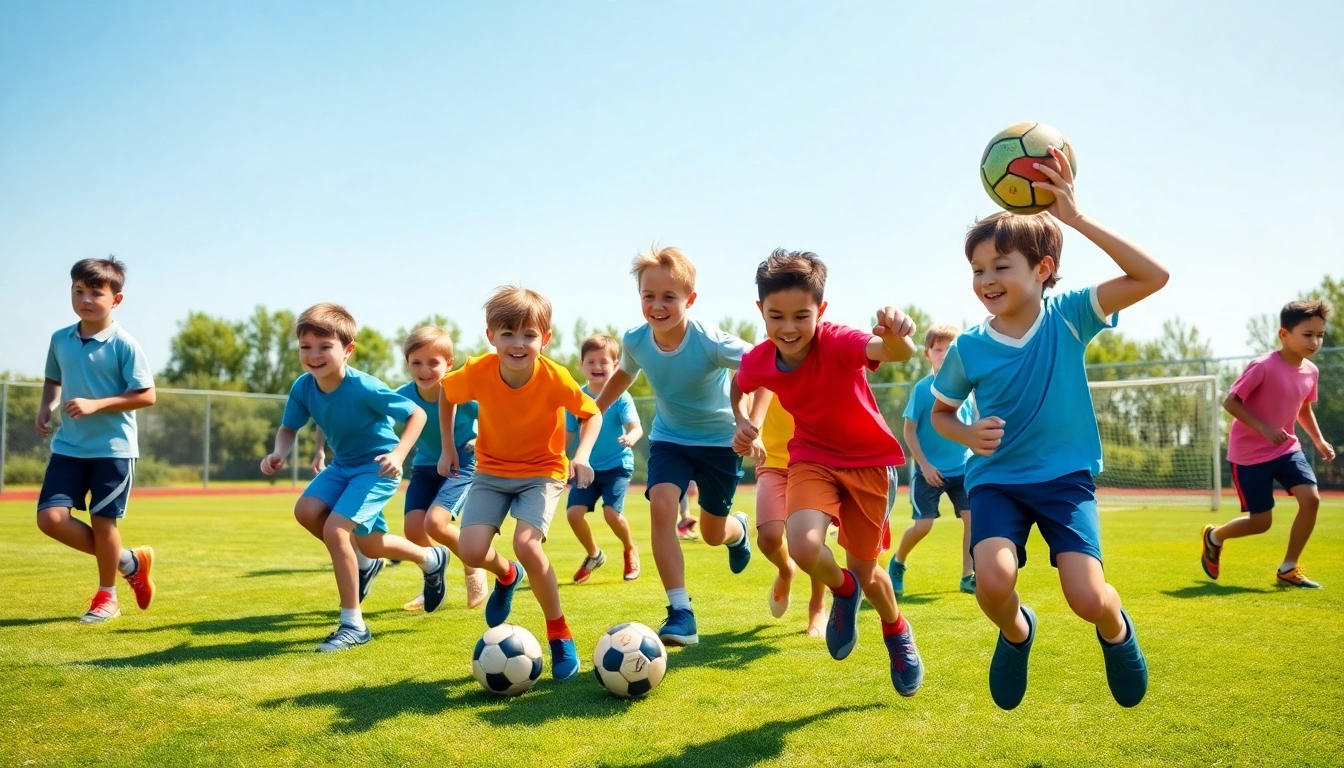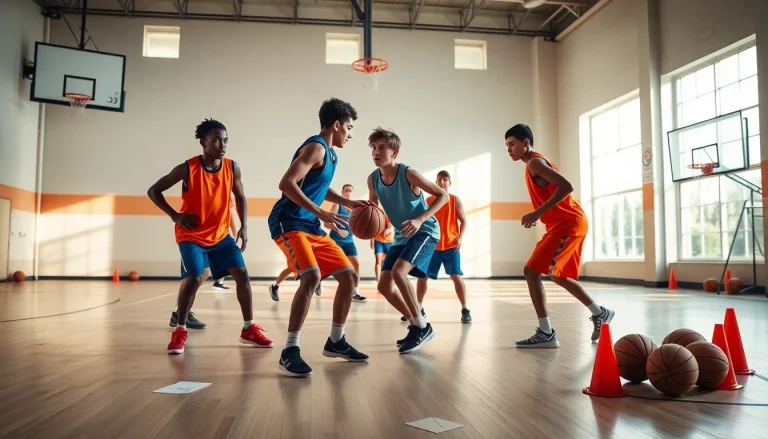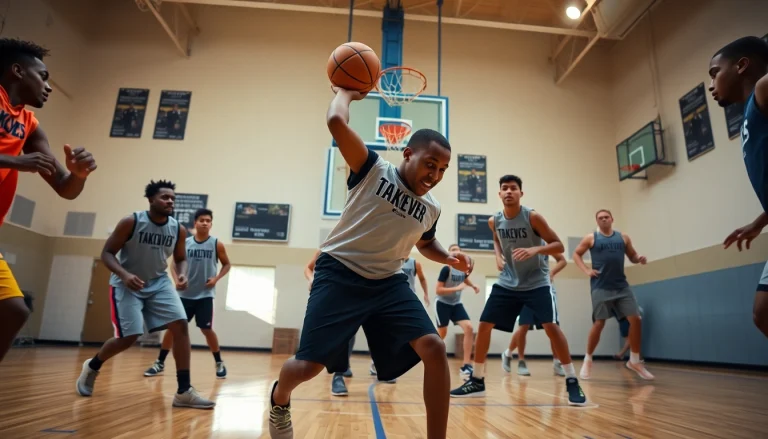Introduction to Multi Sports Camps for Boys
Multi Sports Camps for Boys are rapidly gaining popularity as a unique option for parents seeking holistic developmental experiences for their children. Unlike single-sport camps that focus intently on one athletic discipline, these camps offer a variety of sports activities, allowing boys to engage in multiple sports within a single camp session. This not only broadens their skill sets but also enhances their adaptability and teamwork abilities in various athletic environments. For families interested in finding the perfect opportunity for their active boys, exploring Multi Sports Camps for Boys can provide invaluable insights into what these camps entail.
Understanding the Concept of Multi Sports Camps
Multi Sports Camps combine various sports into one cohesive program. These camps generally include popular sports such as soccer, basketball, baseball, swimming, and tennis, along with alternative options like archery, gymnastics, and martial arts. The idea is to introduce boys to multiple sports, helping them discover their interests and possibilities while obtaining physical exercise and developing critical life skills. The sessions often consist of skill-building workshops, competitions, and friendly matches, ensuring that all participants are actively engaged and learning.
Benefits of Participating in Multi Sports Camps for Boys
Joining a Multi Sports Camp offers numerous benefits, which can be grouped into several categories:
- Physical Development: Exposure to different physical activities promotes overall fitness, balance, and coordination. Engaging in various sports can help boys develop strength and flexibility, reducing the risk of sports-specific injuries.
- Skill Acquisition: Each sport fosters unique skills. For example, soccer improves cardiovascular endurance, while basketball enhances hand-eye coordination. Boys learn to become well-rounded athletes and may even discover a new passion.
- Social Interaction: Camps expose children to peers with similar interests, fostering social skills and teamwork. Boys learn to communicate effectively with others, handle competition gracefully, and develop friendships that may last beyond camp.
- Build Confidence: Mastery of new skills and sports can boost self-esteem. Achievements, whether in games or skill drills, reinforce a sense of accomplishment that encourages boys to challenge themselves further.
- Life Skills: Multi Sports Camps not only focus on athletic abilities but also on teaching life skills such as discipline, leadership, time management, and perseverance.
What to Expect at a Typical Camp
Attending a Multi Sports Camp involves much more than just athletic practice. A typical day at camp may encompass a variety of activities that aim to keep every participant engaged. Here’s a breakdown of what boys can expect:
- Warm-Up Activities: Each day usually begins with group stretching and warm-up exercises designed to prepare the body for physical activity. This setting also serves as a team-building opportunity.
- Skill Sessions: Dedicated sessions focusing on skills pertinent to the different sports being offered. Coaches typically rotate among sports, providing essential feedback and honing techniques.
- Game Time: Boys get the chance to compete in friendly matches, applying the skills they’ve learned. This time reinforces the importance of fair play, teamwork, and strategy.
- Cool Down and Reflection: After an active day, cool down activities help boys lower their heart rates, and reflection time allows them to discuss their learnings with peers and coaches.
- Social Activities: Organized games and activities may also be planned, fostering camaraderie and making lasting memories.
Choosing the Right Multi Sports Camp for Boys
The choice of a Multi Sports Camp can significantly impact your child’s experience. Thus, it’s important to consider several factors before registering.
Factors to Consider When Selecting a Camp
Here are the essential elements to evaluate when exploring Multi Sports Camps:
- Location: Proximity can ease logistical challenges, especially if drop-off and pick-up are required. A convenient location means parents can attend various activities without stress.
- Programs Offered: Ensure the camp provides a diverse sports curriculum that aligns with your child’s interests. You want to ensure there’s enough variety to keep your child engaged.
- Staff Qualifications: Look for camps with trained and certified coaches who have experience working with children and a good understanding of sportsmanship.
- Safety Measures: Evaluate the safety protocols in place. Camps should have adequate supervision and clear plans to address emergencies.
- Reviews and Reputation: Seek out testimonials and feedback from previous attendees. Hearing from other parents and campers can provide valuable insights regarding the quality of the camp.
Types of Activities Offered in Multi Sports Camps
Multi Sports Camps stand out due to their variety of activities. Here’s a closer look at some activities that may be included:
- Team Sports: Activities like soccer, basketball, and baseball usually have team-based formats that build communication skills and strategic thinking.
- Individual Sports: These often include tennis, swimming, and track, encouraging personal growth and self-discipline.
- Recreational Activities: These involve fun alternatives like capture the flag, obstacle courses, and relay races that promote enjoyment alongside serious training.
- Skill Development Workshops: Specific sessions focused on enhancing skills, such as shooting, dribbling, or throwing mechanics, often lead to personalized feedback and improvement.
- Health and Wellness Programs: Campers may also receive basic training on nutrition and physical fitness, emphasizing the importance of a holistic approach to athleticism.
Age Appropriateness and Skill Levels
Understanding the appropriate age group and skill levels of camp activities is crucial for maximizing enjoyment and growth. Camps typically cater to specified age ranges (e.g., 5-12 years) and may adjust activities accordingly. Here are some tips for confirming age appropriateness:
- Review Camp Structure: Understand how the camp differentiates activities for various age groups to avoid overwhelming younger participants or limiting older ones.
- Skill Levels: Ensure the camp accommodates varying skill levels from beginner to advanced. Personalized attention can help all children benefit regardless of their starting point.
- Inclusion in Activities: Look for camps that prioritize inclusivity, offering modifications for different skill levels so all boys can participate fully.
Maximizing the Experience at Multi Sports Camps for Boys
Parents play a vital role in ensuring their children get the best experience possible at camp. Here are ways to maximize their journey.
Important Tips for First-Time Campers
First-time campers may experience anxiety or excitement. Here are strategies to help ease this transition:
- Discuss Expectations: Talk openly with your child about what to expect at camp. Discuss the exciting aspects while acknowledging their potential fears. This balance can help calm nerves.
- Visit the Camp Beforehand: If possible, visit the camp before the start date. Familiarizing them with the environment can reduce anxiety on the first day.
- Encourage Friendships: If other children from your area are attending, encourage them to attend together, as familiar faces can ease the transition.
How to Prepare Your Child for Camp
Preparation can significantly influence the camp experience. Here’s how parents can prepare their boys for a successful adventure:
- Pack Essentials: Ensure your child has all necessary gear, including appropriate sports attire, sunscreen, and personal items. A checklist can be a helpful tool to ensure nothing is left behind.
- Discuss Important Skills: Review basic skills relevant to the sports offered. This can boost your child’s confidence and provide a head start.
- Promote a Positive Attitude: Encourage your child to maintain an open mind toward trying new sports and meeting new friends. Instilling a positive outlook can be essential for a fulfilling camp experience.
Engaging with Camp Staff and Coaches
Strong communication with staff and coaches can enhance the camp experience:
- Encouragement of Feedback: Teach your child how to communicate with coaches about challenges they’re facing or skills they want to improve on.
- Support Open Discussion: Encourage your child to ask questions and contribute to discussions during camp-related activities. Engagement fosters learning and self-expression.
Safety and Health in Multi Sports Camps for Boys
Ensuring safety and health is paramount in any camp environment. Various measures help to safeguard the health and well-being of all campers.
Ensuring a Safe Environment for All Participants
A well-run Multi Sports Camp should prioritize safety in multiple dimensions:
- Staff Training: All camp staff should be trained in child safety protocols, first aid, and emergency response.
- Clear Policies: Camp should clearly communicate policies around injury response, safety gear requirements, and emergency protocols for parents and campers alike.
- Regular Supervision: Ensuring the child-to-coach ratio is appropriate can help maintain focus and safety during activities.
Nutrition and Hydration Guidelines for Campers
Nutrition and hydration are critical components before, during, and after sports activities:
- Balanced Meals: Encourage parents to pack nutritious meals for campers, including fruits, vegetables, lean proteins, and healthy carbohydrates.
- Hydration Reminders: Teach boys the importance of staying hydrated before and during physical activities. Remind them to consume water regularly, especially in hot weather.
- Snack Time Wisdom: Camps should provide healthy snacks, and introduce healthy eating habits by incorporating discussions on the importance of nutrition.
Understanding Emergency Protocols at Camps
Awareness of emergency protocols can reassure parents while providing critical information to campers:
- Emergency Contacts: Keep updated contact information accessible in case of emergency. Parents should know whom to reach out to if issues arise.
- First Aid Readiness: Ensure that camp staff includes certified first aid responders and has a well-stocked first aid kit available.
- Emergency Plans: Camps should have clear evacuation plans and share protocols with campers and parents
Feedback and Evaluation of Multi Sports Camps for Boys
Evaluating experiences at Multi Sports Camps can ensure a continuous improvement cycle that benefits future campers. Gathering information and utilizing feedback are essential aspects.
How to Gather Feedback from Campers
Assessing the camp experience requires structured methods to collect feedback:
- Surveys: Distributing feedback forms at the end of the camp session can allow campers to share their opinions organically.
- Interviews: Engaging in short one-on-one conversations with campers can yield deeper insights into their experiences.
- Discussion Circles: Creating an open forum where campers can express their views encourages camaraderie and heartiness in discussions.
Evaluating the Effectiveness of the Camp Experience
Regular assessments can help analyze the overall effectiveness of camp activities:
- Skill Progression: Assessing how much campers improved their skills during the camp provides tangible metrics for evaluation.
- Engagement Rates: Observing participation levels in various activities can highlight camper enthusiasm and interest.
- Feedback Implementation: Reviewing how previous feedback was adjusted or integrated into updated camp offerings can ensure continued relevance.
Future Improvements and Suggestions
Continuous improvement is paramount for delivering exceptional camp experiences:
- Adapt Programs: Regularly updating sports offerings based on interest trends and camper feedback can keep the camp fresh and relevant.
- Enhance Mentor Programs: Consider implementing mentorship opportunities where older campers can guide their younger peers.
- Incorporate Parent Feedback: Engaging parents in discussions regarding their children’s camp experience encourages a holistic view of the campers’ needs.








